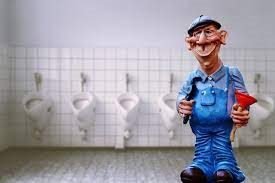Last Updated on February 10, 2025 by Bisma Sehar
Owning a house comes with its fair share of plumbing issues.
Plumbing is something you take for granted until anything goes wrong with it. Even as your house becomes older, you’re sure to encounter some plumbing issues. Fortunately, many of these problems can be handled by the do-it-yourself crowd.
Knowing the most frequent plumbing issues and remedies helps you determine when to hire a plumber and fix the problem yourself. On the other hand, other plumbing problems pose a risk, and you should leave them to the experts. Keep on reading for our full breakdown of the eight most common home plumbing issues and how to deal with them.
Table of Contents
1. The Most Common of All Plumbing Problems: Malfunctioning Faucets
The sound of a leaking faucet is often linked to insanity and decreasing mental health. Even if you’re not at home, you hear it. Your brain becomes indelibly imprinted by the steady beat.
A single drop per second is 2600 gallons each year. The longer you wait for your water bill to arrive, the less likely you will be patient. All you need is a good plumbing repair company to provide you with the correct diagnosis and address the problem.
2. Leaky Pipes
In older homes, pipes account for the majority of all plumbing issues. PEX is the material of choice for most pipes nowadays. However, you may still find copper pipes in many ancient structures.
Copper is more durable than PEX in most situations. Copper has difficulty with high-temperature swings. Copper will crack and shatter as it expands and contracts, while PEX will flex.
Corrosion is a problem for copper pipelines, too. There is a lot of care and maintenance required to keep copper pipes from leaking. Regardless of the material, learn how to winterize your pipes.
3. Issues With Your Toilet
The majority of toilet leaks go undetected. An internal leak in the tank sends water down the drain instead of a visible puddle on your floor. If you miss this, you’ll be wasting your money.
Your toilet might emit hundreds of liters of water, especially if it’s always running. The rubber flapper is a significant cause. They can deform and hence fail to seal the tank adequately.
The chain that connects the flapper to the handle might also get tangled from time to time. Because of this, the flapper would not be able to rest on the bottom. Fortunately, replacing the flapper is an inexpensive and straightforward process.
For less than $20, you can get the entire flushing system. Use food coloring to test for a toilet leak at home.
4. Hose Bibbs That Are Worn Out
Hose bibbs aren’t designed to last numerous seasons of use. People living in frigid climates are more susceptible to the effects of this. The hose bibb will break down due to the temperature fluctuation.
Your hose will leak all over the place if this occurs. You’ll want to purchase a heavy-duty frost-proof brand if you don’t want to keep replacing them throughout the life of your house.
5. Full-On and Partially Clogged Drainage
Clogged pipes are another common problem for homeowners. A clogged toilet is a simple problem to solve. You may need a plunger or a professional for the toughest blockages, but most of the time, it’s only a simple plunge.
You may hear a distinct narrative about clogged sinks and drains. Drain cleaners may be an option if things become incredibly severe. Please don’t flush these poisonous garbage bottles down the toilet. The majority of the time, they fail miserably in their attempts to unclog your drains.
Drain catches on sinks make it simple to retrieve items that accidentally fall into the sink. If you can’t get through to them, it’s time to call in the pros.
Read more: 5 Advantages Of Hiring A Professional Plumbing Company
6. The Sump Pump Is Acting Up
Heavy rain or snow may cause sump pumps to malfunction. To prevent future sump pump failures, you’ll need to do a lot of regular maintenance. Check to see how your plumbing service implemented it as well.
Power outages can damage sump pumps as well as other causes. A pump that you’ve failed to fit correctly will work harder and finally die. Consider reevaluating your irrigation system as an alternative to installing a sump pump.
One of the most important initial steps is to reposition the gutters to drain water from the house’s foundation.
It’s a good idea to invest in sloping your foundation to divert water away from it. To improve water drainage, you may wish to re-level any patios, decks, or concrete surfaces.
In the long run, this might save you thousands of dollars in maintenance and sump pump replacements.
7. Problems With the Sewer System
Sewage systems may get clogged, resulting in terrible stenches. A clogged sewage line may lead to blocked drains throughout your home. There aren’t many things worse than having to diagnose a clogged drain.
The best strategy is to avoid sewage issues at all costs when it comes to sewage issues. Your sinks will fill up with water if the problem is in the sewage line. We strongly advise that a qualified plumber perform any work on a sewage line.
8. A Break in the Water Supply Line
Winter frost is the most severe hazard to water lines. The freezing temperatures might break even a tiny leak in your water line. A pipe may split with just a pinhole-sized break.
If your house or foundation is dealing with water damage, you might be in serious debt. It is well worth it to take the time and effort to check your water line for cracks. Saving thousands of dollars in severe leaks and breaks might be possible if your water line is older.
Dealing With Residential Plumbing Issues: Simplified
No one likes waking up to a clogged toilet. Yet, plumbing problems are a part of homeownership, so you’ll have to face them at some point. We hope that our guide has shed some light on the eight most common plumbing issues that you’re most likely to encounter.
And, if you’re hungry for more tips on home maintenance, then you should head straight to our home improvement section. You’ll find all kinds of guides and explainers there.
















